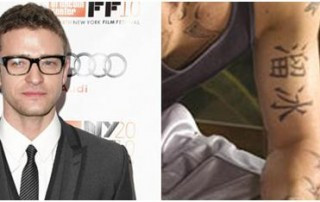Chinese character tattoos are everywhere in the West: I'm sure many of us know someone with some kind of whimsical word or phrase - or maybe even their own name - adorning their skin in ink. They're popular for a number of reasons: they look prettier than Roman letters, they can encompass many different meanings, and they look exotic to non-Chinese. Some people simply think they look cool. However, these tattoos are frequently performed by artists who have very little - if any - knowledge of the Chinese language.
The resulting mistakes can range from a misaligned dot, to characters with entirely different meanings, and most of the time, the tattoo artist and the customer are blatantly unaware that the ink is incorrect. As any student of Mandarin can attest, the Chinese language is a very complex system of thousands of highly developed pictograms - each one with distinctive characteristics, radicals, and meanings. Unfortunately, that also makes it a language that can be easily - for lack of a better word - butchered.
'Mysterious', or just 'Odd'?
Many Chinese bloggers, such as the creator of 'Hanzi Smatter', assert that 'actually grammatically correct Chinese tattoos are almost non-existent'. A quick online search will reveal thousands of mangled Chinese tattoos exposed for what they are: absolute gibberish. For example, one American woman wanted a tattoo of the Chinese word for 'freedom'. What she ended up with was the words for 'free of charge'. There are countless other similar stories of tattoo disasters, and even some celebrities have fallen victim to the trap: Britney Spears has the character 奇 (q ī) stamped on her hip. She was under the assumption that the direct translation was 'mysterious'; but actually, it was 'weird' or 'odd'. Likewise, Justin Timberlake was given a fake Chinese tattoo for his role in 'Alpha Dog', to make him appear like an authentic 'bad boy'. The tattoo he was given was 溜冰 (liūbīng), which means 'skating' or 'ice-skating'... probably not what he was looking for.

Who's at Fault?
You would think that someone looking for a Chinese character tattoo would take the time to make sure that what they want is, in fact, correct. But then again, you would also think that a specialized tattoo artist would not even offer Chinese character tattoos unless they were knowledgeable about the intricacies of the language. Thus, we get a vicious circle where the blind is leading the blind! A general ignorance of the Chinese language is to blame; however innocent this ignorance may be, it often causes life-long consequences. Some tattooists are even under the impression that Chinese is an alphabetic language, and follow nonsensical Chinese 'alphabets' to provide direct transliterations of words and personal names.
The Chinese tattoo blunder phenomenon is even reminiscent of the mangled 'Chinglish' we observe all over China, except sometimes with even more tragically comical (permanent) effects. However, interestingly enough, the Chinese don't share the same taste for tattoos of Westerners. Despite having existed for thousands of years, up until the past five or so years, tattoos were largely considered taboo and flamboyant, and tattoo parlors still only operate with varying degrees of legality. Although tattooists in Shanghai have reported a marked increase in Chinese customers seeking English ink, most customers find them desirable largely from a standpoint of trendiness, rather than the mystique and exoticness sought out by Westerners when they ask for Chinese tattoos.
 Love Them or Hate Them
Love Them or Hate Them
Everyone is prone to making language errors. But with amazing online dictionaries, translators, and other resources at out fingertips (not to mention the help of Chinese friends and teachers!) there is really no excuse anymore for a botched tattoo. If you're considering getting a permanent Chinese tattoo, make sure you do your research. Don't make the same mistake Britney did.
Sasha Small
Marketing Assistant Intern
Don't miss out on more articles and news about Hutong School, the Chinese language, life in China and much more.
Learn Chinese in China